National Guard called to respond to Minneapolis violence
by Tim Sullivan and Amy Forliti The Associated Press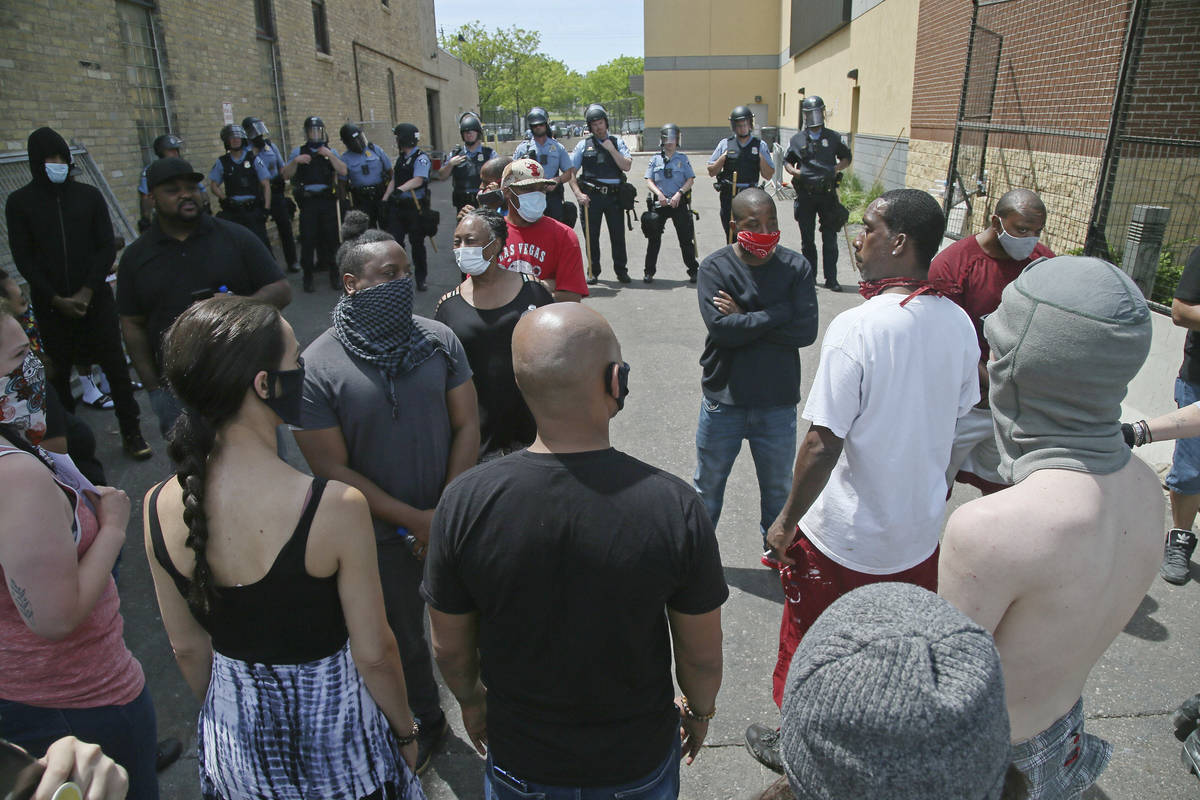
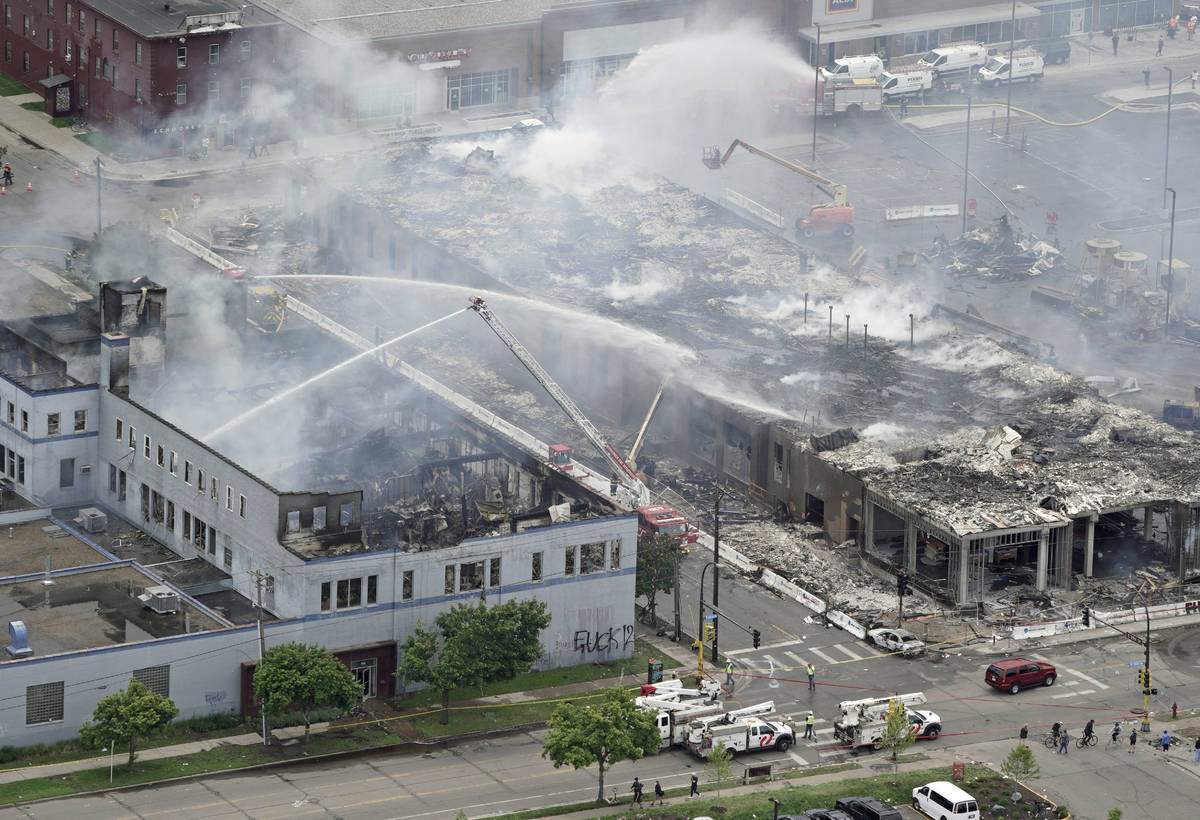
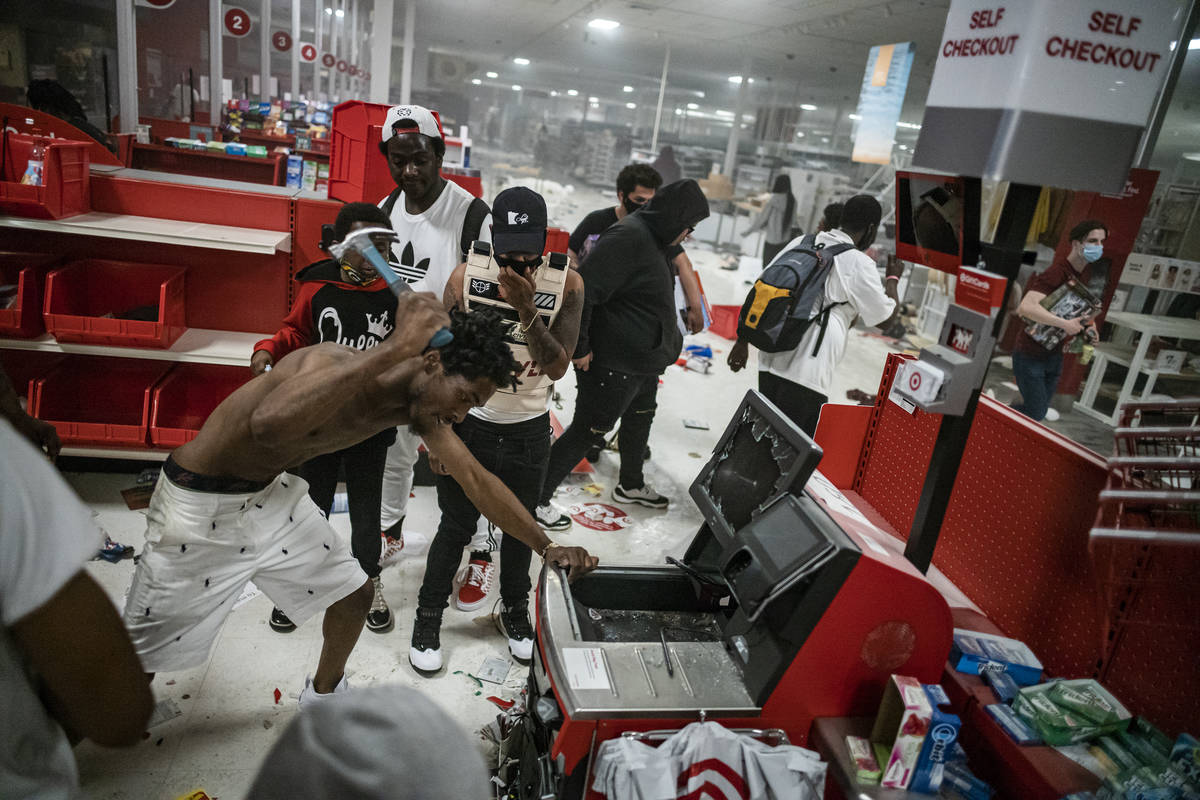
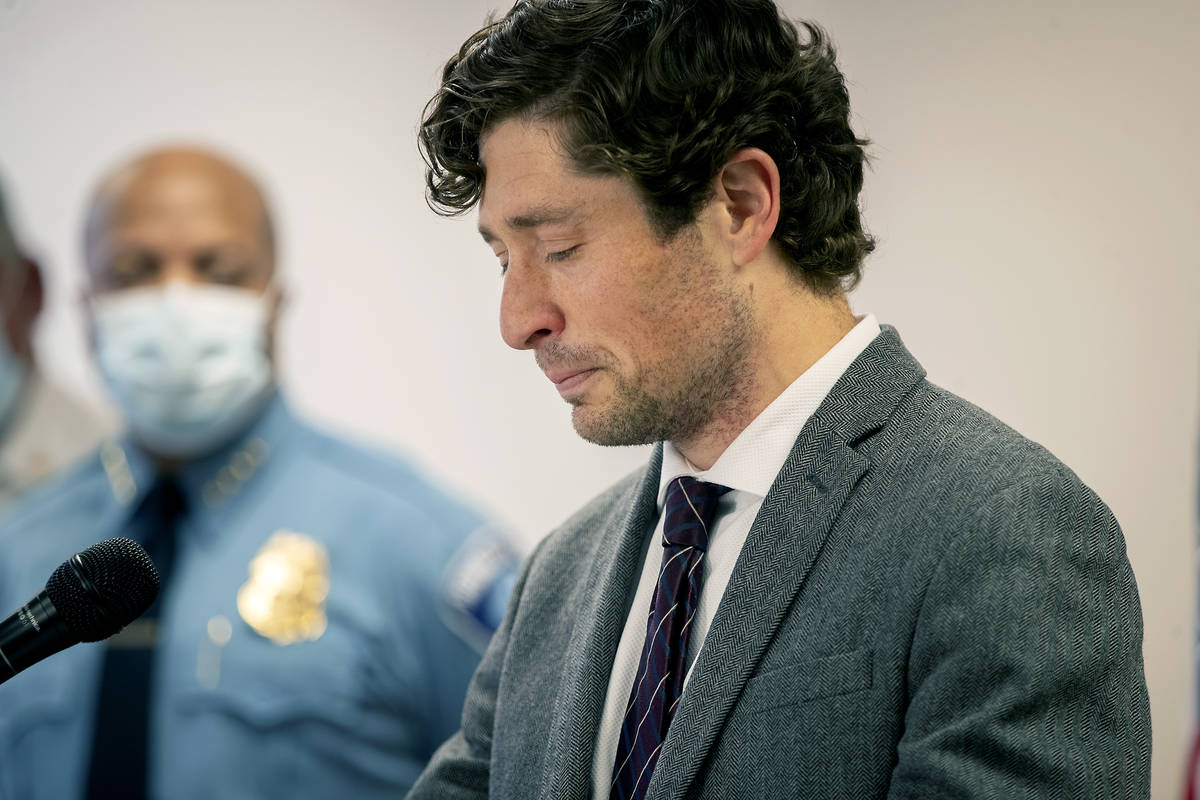
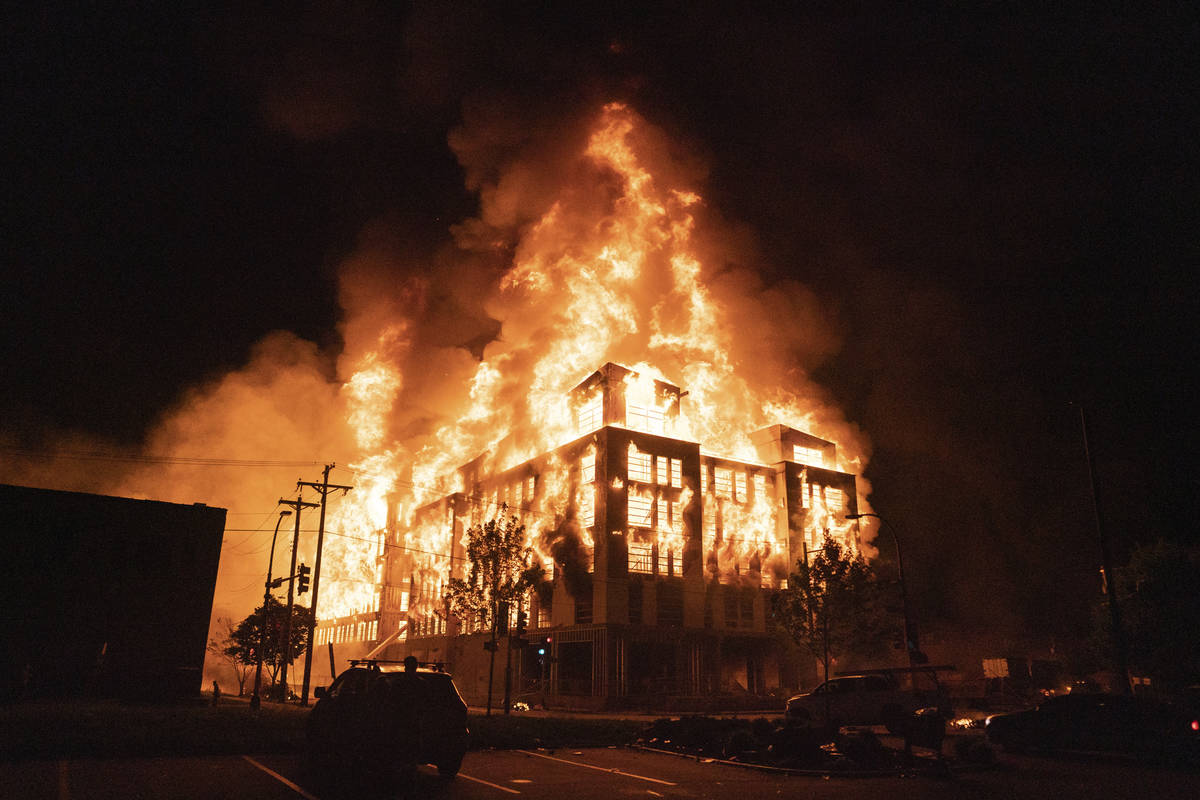
MINNEAPOLIS — Minnesota Gov. Tim Walz called in the National Guard on Thursday as looting broke out in St. Paul and a wounded Minneapolis braced for more violence after rioting over the death of George Floyd, a handcuffed black man in police custody, reduced parts of one neighborhood to a smoking shambles.
The Minneapolis unrest ravaged several blocks in the Longfellow neighborhood, with scattered rioting reaching for miles across the city. It was the second consecutive night of violent protests following Floyd’s death Monday. In footage recorded by a bystander, Floyd can be seen pleading that he can’t breathe as an officer kneels on his neck. As minutes pass, he slowly stops talking and moving.
Dozens of stores in Minneapolis and the suburbs closed early, some boarding up their windows, fearing more strife. The city shut down its light-rail system and all bus service out of safety concerns.
Around midday Thursday, the violence spread a few miles away to St. Paul’s Midway neighborhood, where police said 50 to 60 people rushed a Target attempting to loot it. Police and state patrol squad cars later blocked the entrance, but the looting shifted to shops along nearby University Avenue, one of St. Paul’s main commercial corridors, and other spots in the city. By early evening, the windows of more than a dozen stores were smashed, and firefighters were putting out a handful of small blazes.
St. Paul spokesman Steve Linders said authorities were dealing with unrest in roughly 20 different areas.
“Please stay home. Please do not come here to protest. Please keep the focus on George Floyd, on advancing our movement and on preventing this from ever happening again,” tweeted St. Paul Mayor Melvin Carter, who is black.
Erika Atson, 20, was among several hundred people who gathered outside government offices in downtown Minneapolis, where organizers called for peaceful protest.
Atson, who is black, described seeing her 14- and 11-year-old brothers tackled by Minneapolis police years ago because officers mistakenly presumed the boys had guns. She said she had been at “every single protest” since Floyd’s death and worried about raising children who could be vulnerable in police encounters.
“We don’t want to be here fighting against anyone. We don’t want anyone to be hurt. We don’t want to cause any damages,” she said. “We just want the police officer to be held accountable.”
The governor’s order did not say how many Guard members were mobilized or whether they would be in service Thursday night. After calling in the Guard, Walz urged widespread changes in the wake of Floyd’s death.
“It is time to rebuild. Rebuild the city, rebuild our justice system and rebuild the relationship between law enforcement and those they’re charged to protect,” Walz said.
Thursday morning in Minneapolis, smoke rose from smoldering buildings in the Longfellow neighborhood. In a strip mall across the street from the police’s 3rd Precinct station, the focus of the protests on both nights, the windows in nearly every business had been smashed, from the large Target department store at one end to the Planet Fitness gym at the other. Only the 24-hour laundromat appeared to have escaped unscathed.
“WHY US?” demanded a large expanse of red graffiti scrawled on the wall of the Target. A Wendy’s restaurant across the street was charred almost beyond recognition.
Among the casualties of the overnight fires: a six-story building under construction that was to provide nearly 200 apartments of affordable housing.
“We’re burning our own neighborhood,” said a distraught Deona Brown, a 24-year-old woman standing with a friend outside the precinct station, where a small group of protesters were shouting at a dozen or so stone-faced police officers in riot gear. “This is where we live, where we shop, and they destroyed it.” No officers could be seen beyond the station.
“What that cop did was wrong, but I’m scared now,” Brown said.
Others in the crowd saw something different in the wreckage.
Protesters destroyed property “because the system is broken,” said a young man who identified himself only by his nickname, Cash, and who said he had been in the streets during the violence. He dismissed the idea that the destruction would hurt residents of the largely black neighborhood.
“They’re making money off of us,” he said angrily of the owners of the destroyed stores. He laughed when asked if he had joined in the looting or violence. “I didn’t break anything.”
The protests that began Wednesday night and extended into Thursday were more violent than Tuesday’s, which included skirmishes between offices and protesters but no widespread property damage.
Minneapolis Mayor Jacob Frey appealed for calm but the city’s response to the protests was quickly questioned as things started spiraling into violence. “If the strategy was to keep residents safe — it failed,” City Council Member Jeremiah Ellison, who is black, tweeted. “Prevent property damage — it failed.” On Thursday, he urged police to leave the scene of the overnight violence, saying their presence brings people into the streets.
But Eric Kowalczyk, a police captain in Baltimore during the Freddie Gray riots in 2015, generally supported the Minneapolis police strategy to avoid confrontations with protesters when possible, saying heavy-handed police responses are only met with more violence.
“Nobody wants to see their city on fire, but at the same time, you don’t want to see citizens injured by the very police department they are protesting,” he said.
Protests also spread to other U.S. cities. In California, hundreds of people protesting Floyd’s death blocked a Los Angeles freeway and shattered windows of California Highway Patrol cruisers. Memphis police blocked a main thoroughfare after a racially mixed group of protesters gathered outside a police station.
Amid the violence in Minneapolis, a man was found fatally shot Wednesday night near a pawn shop, possibly by the owner, authorities said.
Fire crews responded to about 30 intentionally set blazes, and multiple firetrucks were damaged by rocks and other projectiles, the fire department said. No one was hurt by the blazes.
The city on Thursday released a transcript of the 911 call that brought police to the grocery store where they arrested the 46-year-old Floyd. The caller described someone paying with a counterfeit bill, with workers rushing outside to find the man sitting on a van. The caller described the man as “awfully drunk and he’s not in control of himself.” Asked by the 911 operator whether the man was “under the influence of something,” the caller said: “Something like that, yes. He is not acting right.” The caller described a tall, bald man matching Floyd’s description, and the operator said officers were on the way.
The U.S. Attorney’s Office and the FBI in Minneapolis said Thursday they were conducting “a robust criminal investigation” into the death. President Donald Trump has said he had asked an investigation to be expedited.
The FBI is also investigating whether Floyd’s civil rights were violated.
The officer who kneeled on Floyd and three others were fired Tuesday. The next day, the mayor called for the kneeling officer to be criminally charged. He also appealed for activation of the National Guard.